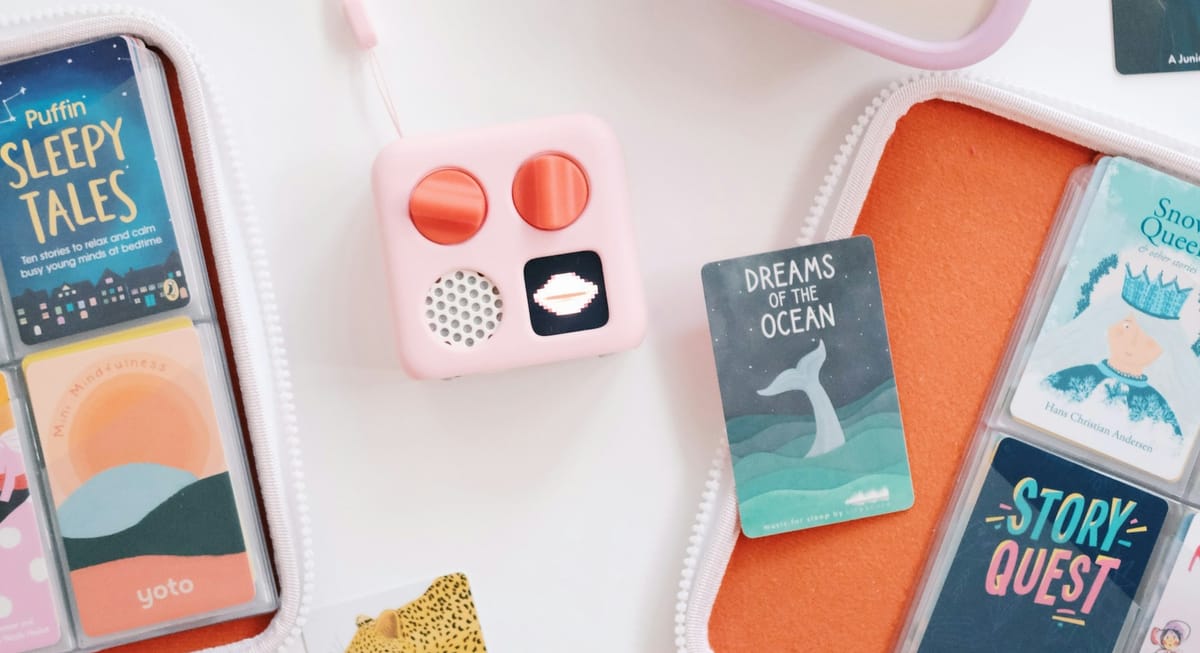Impressions: Yoto

Two things are true this week. First, there isn't a ton of tech news about which I'm really excited to write. Second, I want to take a break from foretelling doom as a result of the election. So I thought this would be a great time to learn about a piece of tech and tell you some of my impressions about it.
So! For my first quasi product review I want to talk about the Yoto music player. Here are the basics:
The Yoto player is a music player for kids. I picked up the mini version, but it comes in two sizes: Yoto Player and Yoto Mini. The primary draw of the device is that it is functionally "screenless." In order to select music, podcasts, or stories to listen to, the player has a large library of cards that slot into the top of the device.

Alongside this primary feature, the Yoto can play kid friendly radio stations and sleep sounds. Via the accompanying app, parents can make custom cards with their own recordings that kids can insert whenever they want. It's got a rechargeable battery, Bluetooth connectivity, and WiFi.
The interface on the mini is extraordinarily basic. The two knobs you see control the whole thing, including volume, the radio, and other functions that are configurable in the app. This thing has a homework timer, this thing has a tooth brushing timer, you can accessorize with a cool case that can attach the player to a backpack.
I was drawn to this device for two primary reasons. The first was the price I saw while glancing around the tech section at Target.
The Mini player I got was $70. If that seems like a lot for what essentially amounts to a Bluetooth speaker for kids, consider what you get just for the $70 (meaning without purchasing any additional cards). You get a functional speaker with multiple free radio stations and Wifi/Bluetooth connectivity. You get an extremely quick and easy to use mobile app for configuring the device. You get a safe and privacy focused way to open kids up to music and storytelling. There is no subscription. There is no subscription. For $70 you get a speaker that simply works and an app that simply works. The larger version is not as portable and is $100, but I still contend that this is an extraordinarily well priced piece of hardware/software.
Across consumer industries, companies are delivering lower quality products for higher quality prices. It is so refreshing to see a player come into the tech space for a reasonable cost for what it offers.
The other reason I was drawn to this product is that I have a fascination (mild obsession) with NFC cards. NFC, or near field communication, is the technology that allows things like tap to pay to work. If you've ever purchased an Amiibo, one of those Nintendo figurines that unlocks special in-game treats, those also work on NFC. I have an NFC card attached to the door frame of the closet in which we have our laundry machines. Since the machines don't have their own timers, I have the card set up so that when I hold my phone to it I can select whether I'm running the washer or the drier and set a timer for it.
I have a vision of a sort of "music wall," something akin to the vinyl album displays music lovers will occasionally display along their walls. What I'd really love is to have a wall with all of my favorite albums where I can walk up to the wall, hold my phone to an album, and it automatically begins playing on my Homepods. I envision this use case as kind of like "putting a record on," but with this intriguing interplay between physical space and digital space.
The Yoto (kind of) allows for a similar functionality. If you own the music files of an album you love, you can create your own card, put it in the player, and listen. I think that is so cool.
The Yoto player is another entry into a product category that could, somewhat pejoratively, be called "dumb tech."
What makes something dumb, though? Is it simply that is doesn't have a glitzy, candy colored screen to suck attention toward? Is it that it doesn't have a fancy camera? Is it that it can't connect to the internet?
I would argue that rather than referring to this algorithm-less, attention respecting, limited use-case tech as "dumb" we should think of it as more thoughtful.
Arguably, our smartphones are too smart. They are too functional. Having one device on which we tell our families we love them, bear witness to genocidal horrors across the globe, listen to the Brat remix album, and take pictures, while technically impressive, does not actually make for a quality user experience. In order to make your phone work at a speed anywhere close to human processing and attention capability, you actively need to fight against how the smartphone was built. You need to aggressively scale back notifications, you need to reorganize the default home screen, and more.
Instead, it is refreshing to have a product that respects you. In order to listen to something, you need to be so intentional about it that you find a physical card and slot it into the device. Nothing happens automatically, no algorithm recommends anything, no detailed profile of your tastes is built. The Yoto Mini does not ask much more of you than the $70 it takes to purchase it. It does not hound you for location data, it does not ask to track your behavior across apps. It asks for an email and a password and (amazingly) does not sign users up for promotions or newsletters by default.
Our so called "smart" technology is smart insofar as it is able to learn everything that there is to know about the user. Their preferences, their location, their contact list, etc. As the saying goes: if you are using something for free, you are the product.
I'm certain I will seem like a grandpa when I say this, but remember the good old days? When you could buy a CD player, or a Gameboy, or a Webkinz and its functional utility lasted years? You didn't have to pretend you read the Terms and Conditions to buy a CD and play it!
It's important to point out that the Yoto is "dumb" explicitly because it is for children. Culturally and politically, we have correctly concluded that extracting data from elementary age children is taboo. We've agreed that children cannot consent to their personal information being taken by companies for profit.
But I often wonder why this is a luxury we afford exclusively to children. I would argue that tech companies have stretched the limits of informed consent when it comes to our data, no matter how old we are. It should not be the norm that whenever we sign up for a new account or download a new app we must agree to a legalese document that functionally zero people read.
The internet and software industries literally exist because of the large scale capability of services like Google, Spotify, Netflix, Facebook, or Instagram to take our data. I find that these companies have improved the value proposition for advertisers and data brokers while forgetting the humans on the ground. The Yoto player reminds me of a time when companies seemed genuinely interested in competing for the hearts of actual people.
With all that said I just want to tack on two things I wish were different about the Yoto.
First, in the case of the Mini, it does not appear to be particularly self-repairable. Often companies will argue that in order to make their devices as durable as possible, they need to limit repairability. That's probably the case here, as the player is meant to be able to be thrown around by kids. But I still wish that it had some exposed screws or a replaceable battery. Much of my fascination with technology as a kid came from being able to take things apart and inspect how they appeared to work. I wish that was an option here.
Second, I want this for adults. The Yoto box says "Ages 3-12+" on it, and a glance through the available cards shows music and audiobooks for an audience spanning those ages. I want there to be more tech that encourages users to be thoughtful about how they use it. I want something that really, actually turns off. I want something that is frictionless, that lets me play music or podcasts without also having to open my whole phone and scroll through the pages and the apps to get what I want. Please let me buy Melodrama by Lorde in card form to play on this thing.
In conclusion, I am obsessed with the idea of this product. If I had a kid, I would derive a lot of pleasure out of selecting music together, recording my own cards, and allowing them free and total reign over something that is just theirs. Our tech doesn't need to be "dumb" but it also doesn't need to be too smart. It's nice to have something that has all the luxuries of modern technology while limiting how much it wants to take from you.





